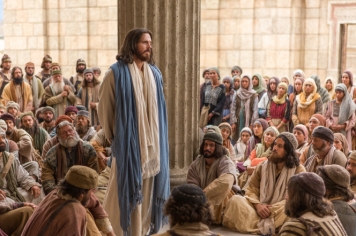Note: This series is written as a first-person narrative to present Jesus in the context he walked in with the unknown disciple that narrates introducing my thoughts and sparking more ideas with his questions. Enjoy.
We were still in the temple area. I noticed the Pharisees listening to the crowd whispering about Jesus. Minutes later, the temple guards found Jesus.
 Jesus said, “I am with you for only a short time, and then I am going to the one who sent me. You will look for me, but you will not find me; and where I am, you cannot come.”
Jesus said, “I am with you for only a short time, and then I am going to the one who sent me. You will look for me, but you will not find me; and where I am, you cannot come.”
The guards and Jews looked at him-puzzled at his riddle–not wanting to take the time to think through it.
The Jews said to one another, “Where does this man intend to go that we cannot find him? Will he go where our people live scattered among the Greeks, and teach the Greeks? What did he mean when he said, ‘You will look for me, but you will not find me,’ and ‘Where I am, you cannot come’?”
While they were still debating that, Jesus slipped away again. We laid low until the last day. I had no idea what Jesus was planning.
We watched the highlight of the Festival of Tabernacles–the water-drawing ceremony. The priests drew water from the Pool of Siloam and lead a procession to the temple. At the temple, they poured out the water at the altar.
It was to signify the scriptural promise that in the time of restoration, rivers of living water would flow from the temple. This promise was supported by Law and the Prophets that was read on the last day of the festival. Ezekiel prophesied about rivers of water flowing from the temple, and Zechariah prophesied about waters flowing from Jerusalem.
Jesus stood and said in a loud voice, “Let anyone who is thirsty come to me and drink. Whoever believes in me, as Scripture has said, rivers of living water will flow from within them.”
I jumped, his yell startling me. What was he talking about?
Some of the people said, “Surely this man is the Prophet.”
The one is coming that’s greater than Moses. Moses himself prophesied about his coming.
Others said, “He is the Messiah.”
Still, others asked, “How can the Messiah come from Galilee? Does not Scripture say that the Messiah will come from David’s descendants and from Bethlehem, the town where David lived?”
The crowd was divided because of Jesus. By then the guards had come again, but they hesitated along with the restless crowd. Some wanted to seize him, but no one laid a hand on him.
Later that night, Nicodemus–one of the Sanhedrin’s Jewish elites-came to see Jesus. He told us what happened when the guards went back to the leaders.
“The temple guards went back to the chief priests and the Pharisees, who asked them, “Why didn’t you bring him in?”
“No one ever spoke the way this man does,” the guards replied.
“You mean he has deceived you also?” the Pharisees retorted. “Have any of the rulers or of the Pharisees believed in him? No! But this mob that knows nothing of the law—there is a curse on them.”
Nicodemus told us he asked, “Does our law condemn a man without first hearing him to find out what he has been doing?”
They replied, “Are you from Galilee, too? Look into it, and you will find that a prophet does not come out of Galilee.”
Nicodemus chuckled, “Jonah, son of Amittai, came from Gath Hepher in Galilee.”
We all got a good chuckle out of that. Though, the anger biased the leaders not to think things through. They were blinded by it.
I thought about the Jewish leaders’ desperation to stay in power and Rome’s desire to keep the peace-through force, if necessary. Add Jesus to the mix…
John 7:32-52
